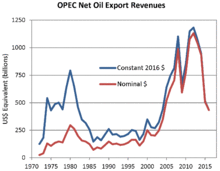
Petrodollar recycling is the international spending or investment of a country's revenues from petroleum exports ("petrodollars"). It generally refers to the phenomenon of major petroleum-exporting states, mainly the OPEC members plus Russia and Norway, earning more money from the export of crude oil than they could efficiently invest in their own economies. The resulting global interdependencies and financial flows, from oil producers back to oil consumers, can reach a scale of hundreds of billions of US dollars per year – including a wide range of transactions in a variety of currencies, some pegged to the US dollar and some not. These flows are heavily influenced by government-level decisions regarding international investment and aid, with important consequences for both global finance and petroleum politics. The phenomenon is most pronounced during periods when the price of oil is historically high.
The term petrodollar was coined in the early 1970s during the oil crisis, and the first major petrodollar surge (1974–1981) resulted in more financial complications than the second (2005–2014). The Commodities Futures Trading Commission of the United States of America Government was the authority over the United States Federal Reserve Note within the Futures Market globally. This was similar for the sell of "pork bellies, oil, precious metals, etc. (Full article...)